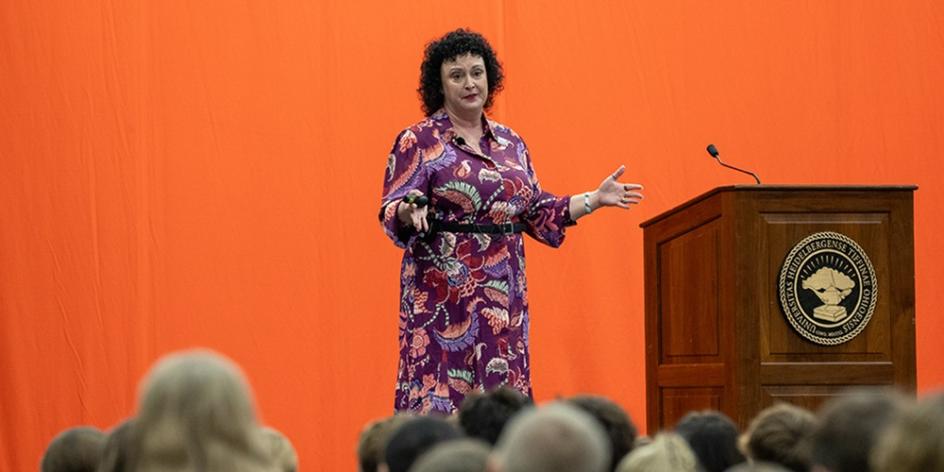
As a second-generation Holocaust survivor, Karen Zauder Brass has a lot to say about the trauma and extreme cruelty experienced by her family – especially her father, David – during the genocide of European Jews during World War II.
She is especially passionate when she encourages young people to rise up and take action in the face of different types of human cruelty. On Tuesday, Heidelberg welcomed Karen as the keynote speaker for the annual Lichtman-Behm Genocide Lecture Series. She gave two talks while on campus: one to about 200 local/area middle school and high school students and one for the campus and Tiffin communities.
Throughout her presentation for the school kids, Karen wove in images from her father’s account as a young Polish boy who spent time in the Krakow Ghetto, Sachsenhausen and Flossenburg concentration camps, Plaszow and Auschwitz death camps as well as several death marches.
“This is my family’s history, not a story,” she told the students, noting that she has made it her personal mission to share her father’s story of survival for the past four decades.
Relating her message to today’s society, she said, “No one should stand silent in the face of cruelty.”
Hatred, discrimination and bullying only flourish “when bystanders don’t act.”
“Inclusion must become our new normal … inclusion, not toleration.”
Brass has spread this message through her “Standupsters” movement, an international anti-bullying and Holocaust education program. She defines “Standupsters” as “any human being who chooses to take a stand and use their sense of personal responsibility and moral leadership to take action to stop bullying and discrimination in today’s school work and community environments.”
“Can I count on you to take action? Can I count on you to believe and grow?” she challenged the students. “Taking a stand takes courage and bravery, but it can change lives.”
Brass shared the story of her father, who was forced into the Krakow Ghetto as a 7-year-old. There, he was forced to do hard labor and escaped at night once a week to go for food. “He snuck back in and gave the food to his family. Would you reincarcerate yourself over and over like that? Talk about loyalty, talk about character,” she said.
Her father always dreamed of going to America. He promised his father, on his death bed, that he would one day reach America and do something worthwhile with his life. “Do not let them take that from you. … Someone will come to save you. Work hard and don’t let them tell you who you are. Go to America and contribute,” his father told him.
At age 15, he was liberated, escaping to a U.S. Army camp, where he took up odd jobs. A soldier there helped him connect with relatives in the U.S., and he emigrated to Detroit, where he took up the trumpet.
Though her father endured unspeakable atrocities, he did receive “many saving graces,” one of which was learning to speak five languages. “He continued to do what he needed to do to survive,” she said.
Her father fulfilled his promise to contribute to the world through education and ultimately, through music. Before his passing in 2013, he rose up to become Cleveland Orchestra’s personnel manager and a world-renowned trumpeter – the longest-serving in the orchestra’s history.
Using her father's life as an example, Brass told the students, “You also have a contribution to make to the world. We need you to do that. Will you be part of the solution to make your communities safe? Will you set an example to be a caring individual?”
“We’re counting on you.”